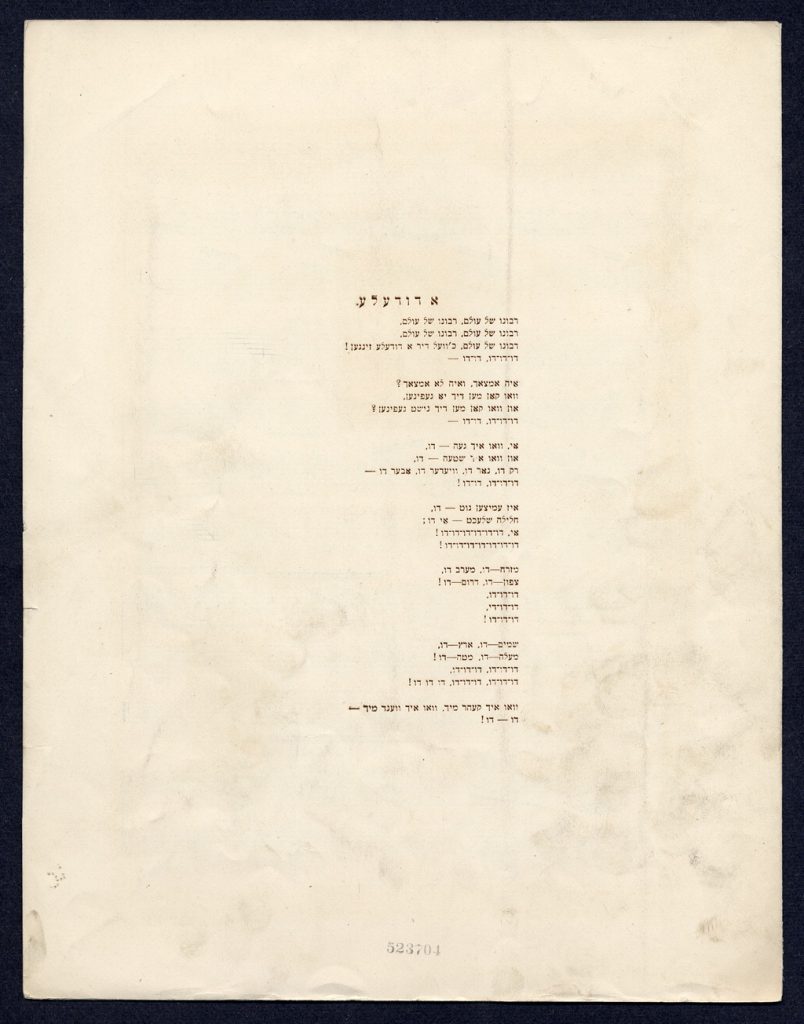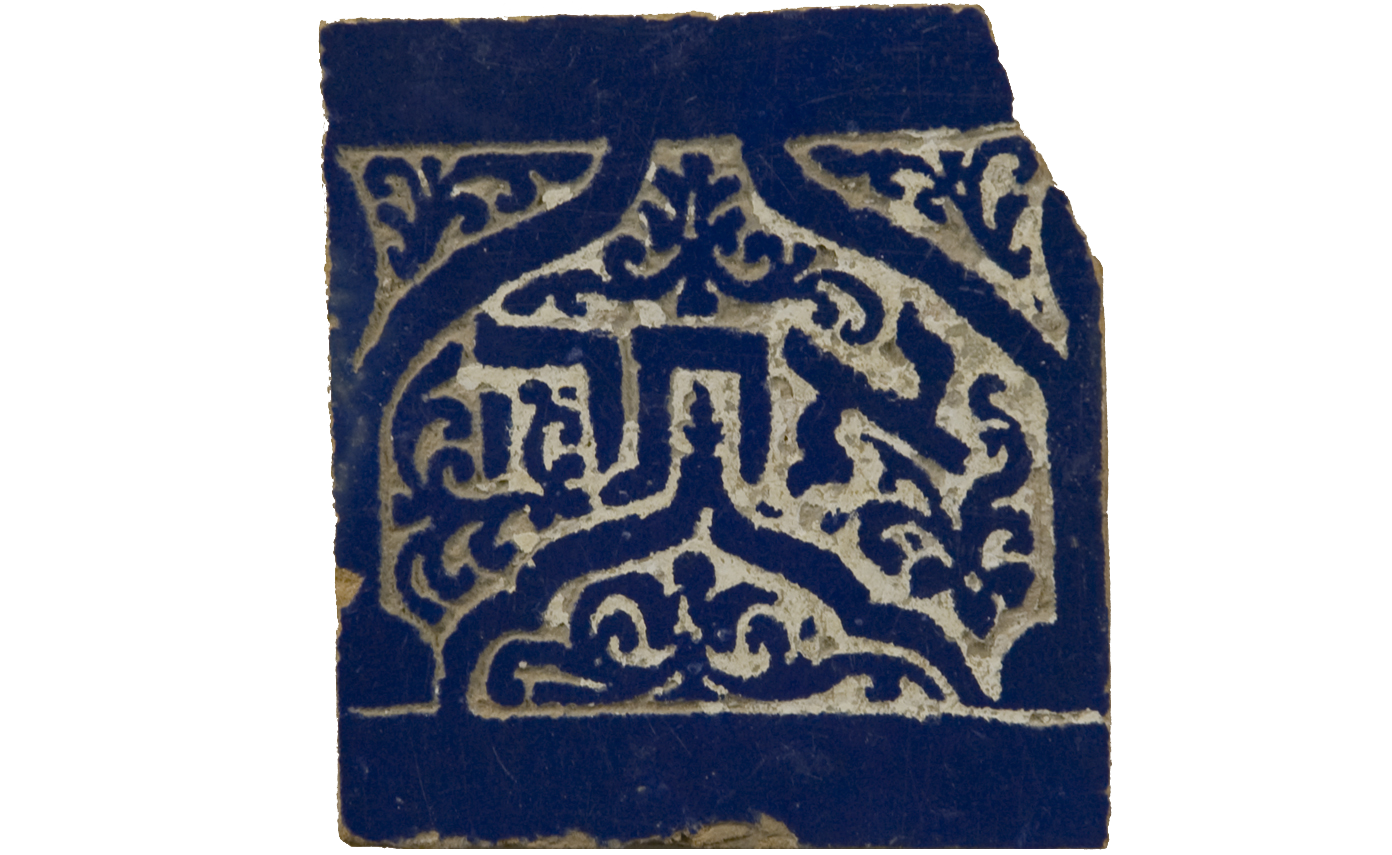| Source (Yiddish) | Translation (Hebrew) | Translation (English) |
|---|---|---|
|
רִבּוֹנוֹ שֶׁל עוֹלָם
רִבּוֹנוֹ שֶׁל עוֹלָם רִבּוֹנוֹ שֶׁל עוֹלָם רִבּוֹנוֹ שֶׁל עוֹלָם רִבּוֹנוֹ שֶׁל עוֹלָם! כ´װעל דיר אַ דוּדעלע זינגען! דוּ־דוּ־דוּ, דוּ־דוּ — |
רִבּוֹנוֹ שֶׁל עוֹלָם
רִבּוֹנוֹ שֶׁל עוֹלָם רִבּוֹנוֹ שֶׁל עוֹלָם רִבּוֹנוֹ שֶׁל עוֹלָם רִבּוֹנוֹ שֶׁל עוֹלָם! אֲנִי רוֹצֶה לָשִׁיר לְךָ שִׁיר! אַתָּה־אַתָּה־אַתָּה אַתָּה־אַתָּה — |
Ribono shel Olam
Ribono shel Olam Ribono shel Olam Ribono shel Olam Master of the Cosmos! I want to sing a little song for you You you you, you you — |
|
אַיֵּה אֶמְצָאֶךָּ?
וְאַיֵּה לֹא אֶמְצָאֶךָּ? װאוּ קאַן מען דיך יאָ געפֿינען? און װאוּ קאָן מען דיך נישט געפֿינען? דוּ־דוּ־דוּ, דוּ־דוּ — |
אַיֵּה אֶמְצָאֶךָּ?
וְאַיֵּה לֹא אֶמְצָאֶךָּ? אָנָה אֶמְצָאֶךָּ? אַךְ אָנָה לֹא אֶמְצָאֶךָּ? אַתָּה־אַתָּה־אַתָּה אַתָּה־אַתָּה — |
Where shall I seek you?[1] cf. Proverbs 7:15. A short prayer on this theme in quoted in Ḥovot haLevavot by Bachya ibn Paquda (1050-1120): ונאמר על קצת מן החכמים שהיה אומר בתפלתו אלהי אנה אמצאך אך אנה לא אמצאך נסתרת ולא תראה והכל ממך מלא. דומה למה שאמר יתברך אֶת־הַשָּׁמַיִם וְאֶת־הָאָרֶץ אֲנִי מָלֵא נְאֻם־יְהוָה (ירמיהו כג:כד) (It is said of one of the Sages who would say in his prayer: “My elo’ah, where can I find you, yet where can I not find you. You are hidden and invisible yet everything is filled with you, similar to the verse “‘Do I not fill heaven and earth,’ says YHVH” (Jeremiah 23:24)). Note also, Song of Songs 8:1.
And where shall I not seek you? Where can I find you? And where can I not find you? You you you, you you — |
|
אָי, װאוּ איך געה – דוּ!
און װאוּ איך שטעה – דוּ! רַק דוּ, נאָר דוּ, װידער דוּ, אָבער דוּ — דוּ־דוּ־דוּ, דוּ־דוּ! |
אוֹי, אִם אֲנִי אֵלֵךְ – אַתָּה
אִם אֲנִי נִשְׁאָר – אַתָּה רַק אַתָּה תָּמִיד אַתָּה פֹּה אַתָּה שָׁם אַתָּה — אַתָּה־אַתָּה־אַתָּה אַתָּה־אַתָּה! |
Oy, if I go — You![2] cf. Megillat Yonah.
If I stay — You! Only you. Always you. Here: You. There: You — You you you, you you! |
|
איז עמעצן גוט – דוּ,
חָלִילָה שלעכט – אָי, דוּ; אָי, דוּ־דוּ־דוּ־דוּ־דוּ־דוּ! דוּ־דוּ־דוּ־דוּ־דוּ־דוּ־דוּ! |
כְּשֶׁזֶּה טוֹב – אַתָּה
כְּשֶׁזֶּה, חָלִילָה, רַע – אוֹי, אַתָּה; אוֹי, אַתָּה־אַתָּה־אַתָּה־אַתָּה־אַתָּה־אַתָּה! אַתָּה־אַתָּה־אַתָּה־אַתָּה־אַתָּה־אַתָּה־אַתָּה! |
When it’s good — You,
[When it’s,] Heaven forfend, bad — Oy, you;[3] cf. Birkat Yotser Ohr. A statement of non-duality. Oy! You you you you you you! You you you you you you you! |
|
מִזְרָח – דוּ,
מַעֲרָב – דוּ, צָפוֹן – דוּ, דָּרוֹם – דוּ! דוּ־דוּ־דוּ, דוּ־דוּ־דוּ, דוּ־דוּ־דוּ! |
מִזְרָח – אַתָּה,
מַעֲרָב – אַתָּה, צָפוֹן – אַתָּה, דָּרוֹם – אַתָּה! אַתָּה־אַתָּה־אַתָּה אַתָּה־אַתָּה־אַתָּה אַתָּה־אַתָּה־אַתָּה! |
In the east: You.
In the west: You. In the north: You. In the south: You! You you you You you you You you you! |
|
שָׁמַיִם – דוּ
אֶרֶץ – דוּ מַעְלָה – דוּ מַטֶּה – דוּ! דוּ־דוּ־דוּ, דוּ־דוּ־דוּ, דוּ־דוּ־דוּ, דוּ־דוּ־דוּ, דוּ דוּ דוּ! |
שָׁמַיִם – אַתָּה
אֶרֶץ – אַתָּה מַעְלָה – אַתָּה מַטֶּה – אַתָּה! אַתָּה־אַתָּה־אַתָּה אַתָּה־אַתָּה־אַתָּה אַתָּה־אַתָּה־אַתָּה אַתָּה־אַתָּה־אַתָּה אַתָּה אַתָּה אַתָּה! |
In the Heavens: You.
On Earth: You. Above: You. Below: You! You you you You you you You you you You you you You you you! |
|
װאוּ איך קער מיך
און װאוּ איך װענד מיך – דוּ – דוּ! |
לְאָן אֲנִי עוֹבֵר
וּלְאָן אֲנִי חוֹזֵר – אַתָּה – אַתָּה! |
Where I turn to,
And where do I return to? You — you! |
Set to music by Leo Low (1878-1960) and performed by Mordechai Hershman (1888–1940) in 1921, “A Dudele” is a song attributed to Rabbi Levi Yitshaq of Berditchev, which he sung during havdallah, and on Rosh haShanah and Yom Kippur. The Diaspora Yeshiva Band adapted the song in Hebrew for their album Melave Malkah (1977). A direct antecedent for the panentheist concept of divinity expressed here can be found in a short prayer quoted in Ḥovot haLevavot by Bachya ibn Paquda (1050-1120) (see annotation below).
Source(s)

A Dudele of Rabbi Levi Yitshaq of Berditchev (lyrics included with the sheet music of Leo Low, 1921)
Recordings
Notes
| 1 | cf. Proverbs 7:15. A short prayer on this theme in quoted in Ḥovot haLevavot by Bachya ibn Paquda (1050-1120): ונאמר על קצת מן החכמים שהיה אומר בתפלתו אלהי אנה אמצאך אך אנה לא אמצאך נסתרת ולא תראה והכל ממך מלא. דומה למה שאמר יתברך אֶת־הַשָּׁמַיִם וְאֶת־הָאָרֶץ אֲנִי מָלֵא נְאֻם־יְהוָה (ירמיהו כג:כד) (It is said of one of the Sages who would say in his prayer: “My elo’ah, where can I find you, yet where can I not find you. You are hidden and invisible yet everything is filled with you, similar to the verse “‘Do I not fill heaven and earth,’ says YHVH” (Jeremiah 23:24)). Note also, Song of Songs 8:1. |
|---|---|
| 2 | cf. Megillat Yonah. |
| 3 | cf. Birkat Yotser Ohr. A statement of non-duality. |


